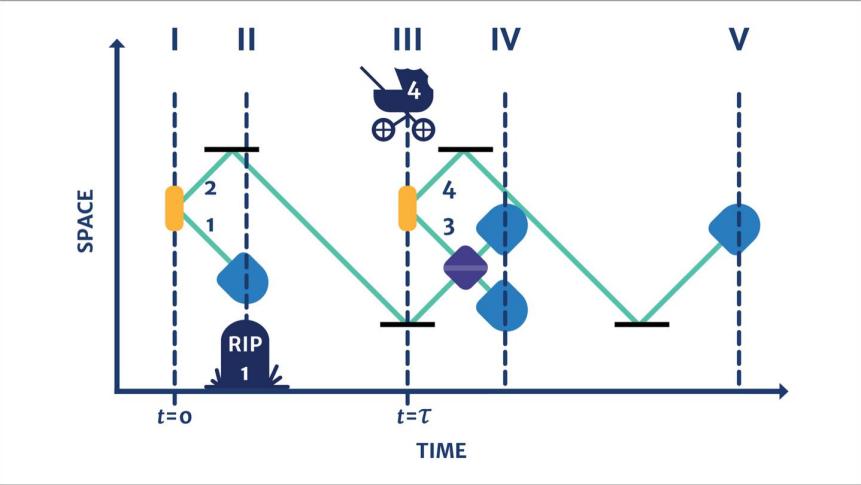
Getty Images
Entangled Quantum Particles Can "Communicate" Through Time
In the world you know, actions have causes and effects, objects exist as one thing or another, and everything is what it is whether you observe it or not.
In the quantum world, those rules go out the window. Take quantum entanglement, for example. You can make two quantum particles interact, then put them at opposite ends of the universe, and measure one. Whatever measurement you get, the other particle takes on a corresponding quality instantaneously, no matter the distance. Well, forget distance — particles can even be entangled through time.

Getty Images
Teeny Tiny Time Travel
To understand quantum entanglement, think about a pair of gloves. If you open a box and see a right-handed glove, you know that its mate is left-handed, even if it's nowhere to be seen. But in quantum entanglement, it's as if opening the box and seeing a right-handed glove actually turned the other glove left-handed — both were in a "superposition" of right- and left-handedness until one was observed, and both changed their states in relation to each other. It's what Einstein called "spooky action at a distance."
This entanglement, it turns out, extends to time as well — "spooky action at a delay," as George Musser put it in Quanta Magazine. In 2013, a team of researchers at the University of Jerusalem actually demonstrated this weird phenomenon in the lab. Here's how they did it.
First, they entangled a pair of particles (1 and 2, in step I of the diagram above). Next, they measured a property of particle 1 (step II) — and when you measure something in a quantum system, it's dead. Bye-bye, particle 1. Meanwhile, particle 2 kept on whizzing along while the team entangled a new pair of particles, 3 and 4. Then, they measured particle 3 with particle 2 in a way that transferred their relationships with their old pairings onto their new 2-3 pairing (step IV). Particle 4 is whizzing off by itself, and eventually, the team measures it. The measurement was correlated with the measurement of particle 1, even though particle 4 didn't even exist when particle 1 died.
Did measuring particle 1 send information to the future to affect particle 4? Did measuring particle 4 retroactively change the measurement of particle 1? Neither question makes sense because, as hard as it is to fathom, quantum systems don't have definite properties. Their properties change based on when and how they're measured. Both options are true, and neither. Forget it; it's quantum town.
Heads, You Won; Tails, You Lost
For a more real-world example, consider this thought experiment conceived by physicists at the University of Vienna. Alice and Bob play a coin-toss game; they take turns secretly tossing a coin, then writing down their result and their prediction for the other person's toss on a piece of paper. When they're done, they give their paper to the other person, and the other person tosses their coin.
Say Alice does the coin toss first and writes down her result and her prediction, then hands her paper to Bob. Alice has a 50 percent chance of being right, but Bob knows the answer, so he'll have a 100 percent chance of being right. The opposite would happen if Bob went first. Whatever order they do it in, it always averages out to a 75 percent success rate overall. But if you don't have them do this in a certain order, and you swap the paper for a quantum particle and the coin-toss results for measurements of that particle, you get an 85 percent success rate.
Weird, right? It's as if seeing the results retroactively improves the players' chances of guessing right, as if they can look into the future. That's entangled time. It's not just a mind-bending thought experiment, either — if we can harness it, it could mean big things for future technology. We're already tinkering with encrypting communication using quantum entanglement through space. If we could do it through time, who knows what kind of breakthroughs could arise?
This article first appeared on Curiosity.com.


















